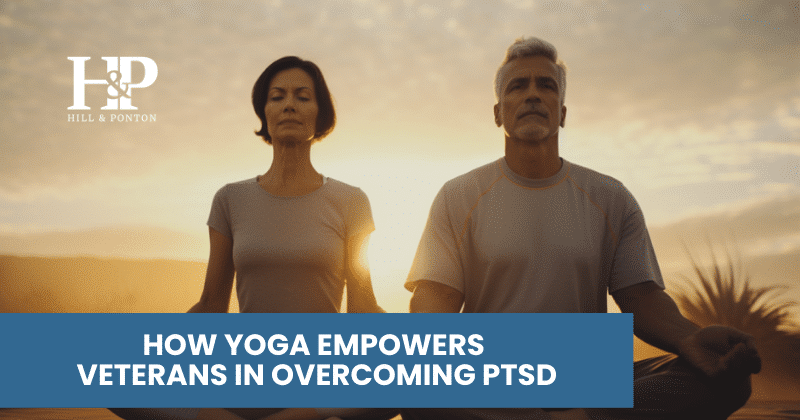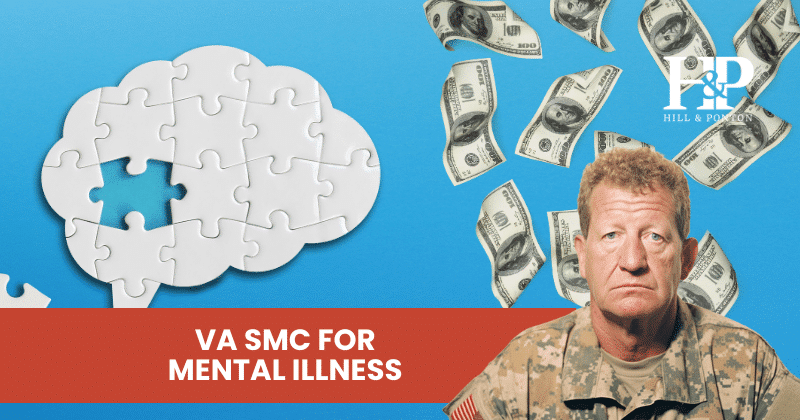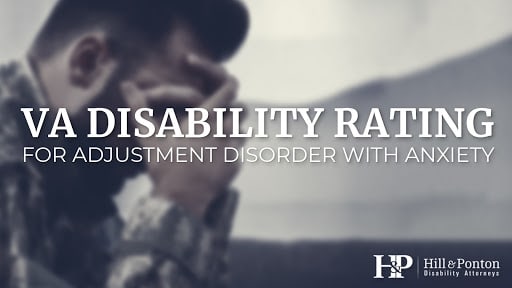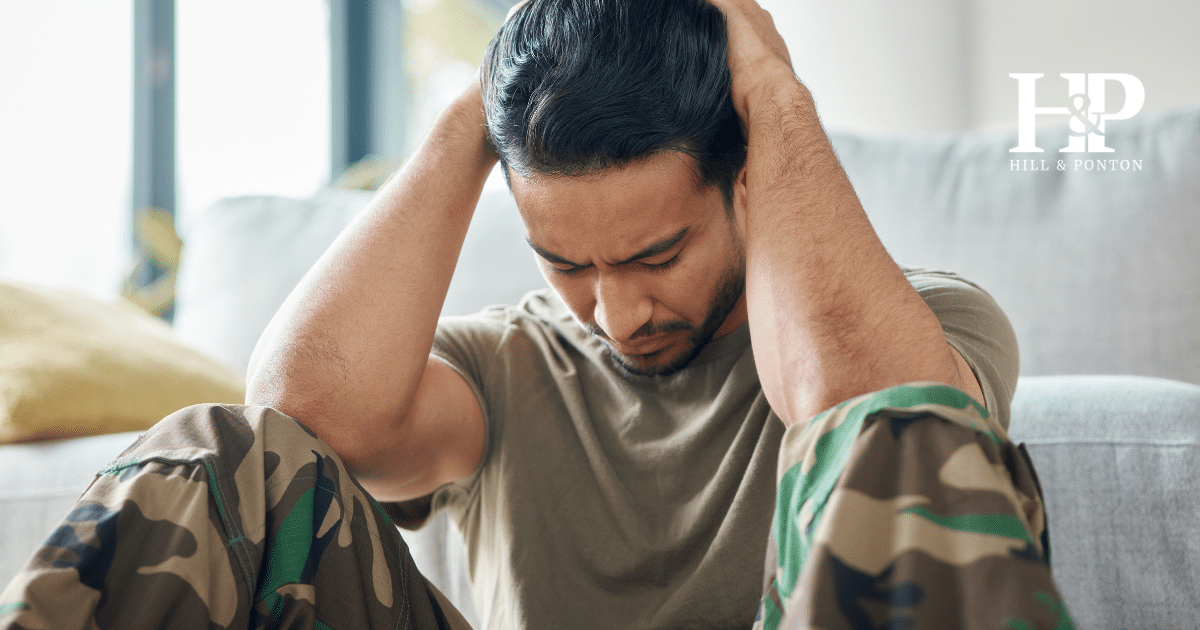Today we’re addressing a topic of vital importance to veterans across the United States – Post-Traumatic Stress Disorder (PTSD). This mental health condition, characterized by severe emotional distress triggered by traumatic experiences, impacts a significant number of veterans, casting a profound influence on their lives.
Yet, amidst this challenging landscape, there are beacons of hope, including a mainstream and exciting form of alternative therapy and exercise that has taken up popularity–Yoga.
An ancient practice that has transcended the test of time, yoga is increasingly recognized as a powerful therapeutic tool in managing PTSD.
In this post, we delve into the world of yoga as a means to empower veterans in their journey towards overcoming PTSD. We’ll explore the science behind it, learn from the experiences of those in the community who have found solace in its practice and provide resources to aid you or others in your life in embarking on this healing journey.
Yoga may not be a conventional method to most, but as you’ll discover, it can be a very formidable one.
Understanding PTSD Among Veterans
Post-Traumatic Stress Disorder, also known as PTSD, is a mental health condition which sometimes occurs following the experiencing or witnessing of life-threatening and/or traumatic events, such as military combat, natural disasters, terrorist incidents, serious accidents or physical or sexual assault.
The Department of Veterans Affairs (VA) reports PTSD afflicts approximately 11-20% of veterans of the Iraq and Afghanistan wars, 10% of Gulf War veterans and up to 30% of Vietnam War veterans.
The ramifications of PTSD are profound, affecting every faucet of a veteran’s life. It can lead to sleep problems, irritability, feelings of guilt or numbness and even physical pain.
The ripple effect extends to relationships with loved ones, job performance and overall quality of life.
Understanding PTSD is the first step toward empowerment. It’s recognizing it isn’t a sign of weakness, but a testament to the experiences our veterans have lived through.
The Role of Yoga in PTSD Management
Yoga is an ancient practice that originated in India over 5,000 years ago. It is much more than a form of exercise; it’s a mind-body practice that combines physical postures, breathing exercises, meditation and a distinct philosophy. There are many different styles of yoga including:
- Hatha
- Vinyasa
- Ashtanga
- Kundalini
Each has a unique focus, yet all are aimed at promoting a sense of balance and well-being.
Yoga and Mental Health
Yoga is increasingly recognized for its potential benefits to mental health. It has been found to reduce stress levels, enhance mood and improve sleep quality, all of which are beneficial for those grappling with mental health issues like PTSD.
It also encourages mindfulness, the practice of being fully present and engaged in the current moment. This mindfulness can foster emotional regulation, helping individuals respond to stress and anxiety in healthier ways.
Yoga promotes body awareness, allowing practitioners to recognize and manage physical symptoms of stress and anxiety.
By combining physical poses with deep breathing and meditation, yoga offers a holistic approach to managing PTSD.
The physical postures can help release tension and improve physical health, while breathing exercises and meditation can calm the mind and reduce symptoms of anxiety and depression.
Yoga as a Healing Tool for Veterans with PTSD
Yoga, with its unique blend of physical movement, controlled breathing and meditation, addresses the symptoms of PTSD on multiple levels.
From a physiological perspective, PTSD is often associated with heightened activity in the sympathetic nervous system–the system that puts us into a state of “fight or flight” in response to perceived threats.
Yoga, however, promotes activity in the parasympathetic nervous system, which serves to calm the body down after the danger has passed. It can reduce heart rate, lower blood pressure and help the body feel calm and relaxed, counteracting the stress response.
The mindfulness aspect of yoga can help individuals stay focused on the present, rather than being consumed by past traumatic events or worries.
This focus on the ‘now’ helps to create a mental state that is less likely to trigger PTSD symptoms.
Additionally, the practice of yoga helps individuals reconnect with their bodies, fostering self-compassion and understanding.
This awareness can be especially powerful for veterans with PTSD, because they may often feel disconnected or detached from their bodies due to traumatic experiences.
Key Benefits for PTSD
Yoga’s potential benefits for PTSD, specifically veterans who are diagnosed with it, is so far-reaching, the list can be never-ending. However, these are some of the most common:
- Improved physical health: Regular yoga practice increases flexibility, enhances strength and improves balance, all of which contribute to better physical health.
- Enhanced mental clarity and focus: Yoga and meditation can promote improved concentration and cognitive function.
- Reduction in anxiety and stress: By promoting relaxation and mindfulness, yoga can help reduce symptoms of stress and anxiety commonly associated with PTSD.
- Promoting better sleep: Yoga’s calming effects can improve sleep quality, a common issue for those suffering from PTSD.
- Increased self-awareness and mindfulness: Regular yoga practice fosters a stronger connection between the mind and body, promoting self-awareness and helping veterans better understand and manage their symptoms.
- Enhanced emotional resilience and self-regulation: Through the practice of mindfulness and controlled breathing, yoga can help improve emotional control, resilience and ability to manage stress responses.
Yoga Resources for Veterans
For veterans interested in exploring yoga as a therapeutic practice, numerous resources are available.
Programs for Veterans
Several organizations offer yoga programs designed specifically for veterans.
These include:
- Veterans Yoga Project: The Veterans Yoga Project offers free online yoga classes specifically tailored for veterans. You can find their classes here.
- Warrior’s Ascent: This organization provides a week-long healing program that includes yoga, meditation, and mindfulness training. Learn more about their work here.
- Connected Warriors: Connected Warriors offers free trauma-conscious yoga classes for veterans, service members, and their families. Visit their website here.
Tips for Starting Yoga Practice
If you are considering starting a yoga practice, consider the following:
- It’s advisable to start slow and seek professional guidance
- Consider reaching out to a local yoga studio or an online platform that offers beginner-friendly, trauma-conscious yoga classes
- Always remember to listen to your body and adjust your practice as necessary
Conclusion
In the battle against PTSD, yoga emerges as a powerful ally for veterans, offering a host of physical, emotional, and mental benefits.
By fostering self-awareness, mindfulness, and physical well-being, yoga empowers veterans in their journey towards overcoming PTSD and reclaiming control over their lives.
While the path to recovery may be challenging, know that you are not alone.
Whether you’re a veteran grappling with PTSD or a friend, family member, or healthcare provider looking for ways to support a loved one, yoga can offer a promising and accessible tool for healing.
References
For more information on PTSD and the benefits of yoga, check out these additional links:
- National Center for PTSD website
- “Yoga for post-traumatic stress disorder – a systematic review and meta-analysis” study
- “Effect of yoga on the quality of life of patients with post-traumatic stress disorder: A randomized controlled trial” study
- “Trauma-Sensitive Yoga as an Adjunct Mental Health Treatment in Group Therapy for Survivors of Domestic Violence: A Feasibility Study” study




